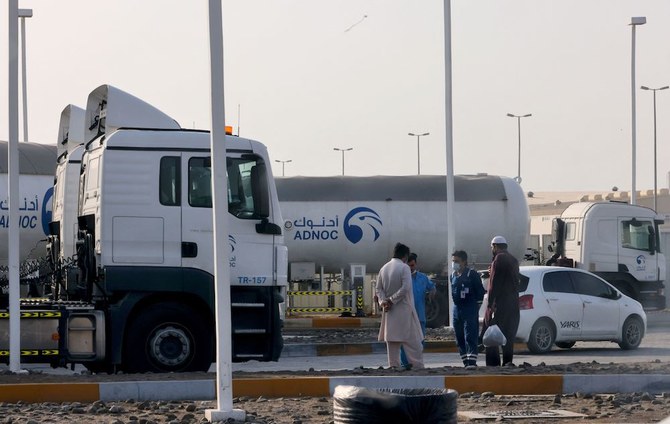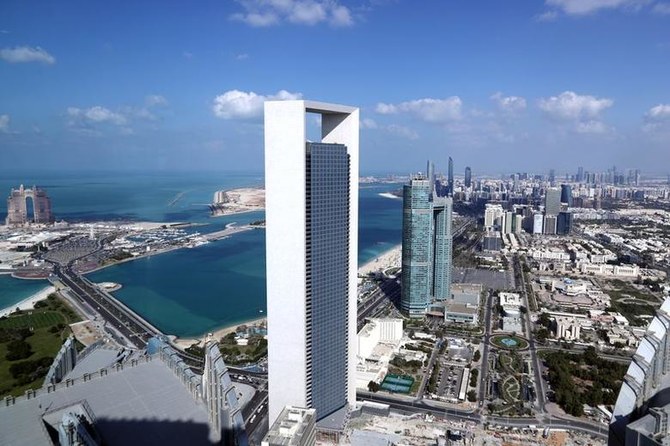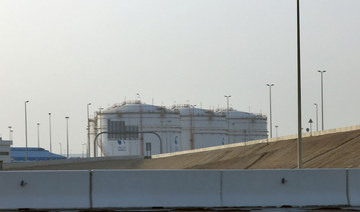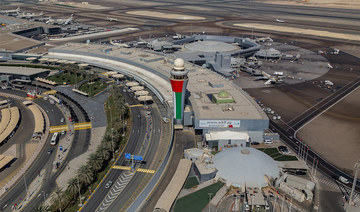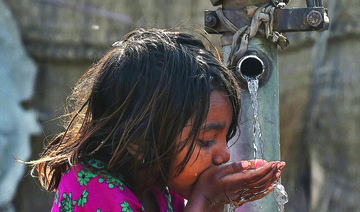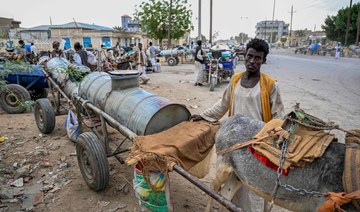RIYADH: Saudi Arabia’s Foreign Minister strongly condemned a Houthi “terrorist attack” targeting civilian areas and facilities in the UAE on Monday.
A drone attack targeting a key oil facility in Abu Dhabi killed three people and sparked a separate fire at Abu Dhabi's international airport on Monday, police said.
The attack, claimed by the Houthis, also resulted in six people being injured.
READ MORE
Three people – one Pakistani and two Indian - were killed and six others injured after three fuel tankers exploded in the industrial area of Musaffah ICAD 3 near an ADNOC storage unit in Abu Dhabi. Click here for more.
During a phone call with his Emirati counterpart, Prince Faisal bin Farhan affirmed the Kingdom's full solidarity with the UAE in the face of all threats to its security and stability.
Prince Faisal stressed that the security of the UAE and Saudi Arabia are indivisible and offered his condolences to the families of the victims of “this cowardly terrorist attack,” and to the government and people of the UAE.
An earlier statement issued by the Kingdom’s foreign ministry condemned in “the strongest terms” the “cowardly terrorist attack” that targeted Abu Dhabi International Airport on Monday.
Opinion
This section contains relevant reference points, placed in (Opinion field)
The statement said that this terrorist act, which the Houthis are responsible for, “reaffirms the danger of this terrorist group and its threat to security, peace, and stability in the region and the world.”
The Kingdom stressed that it continues to confront all Houthi terrorist attempts and practices through its leadership of the Coalition to Restore Legitimacy in Yemen.
The Kingdom offered its sincere condolences and sympathy to the families of the victims and to the government and people of the UAE, wishing a speedy recovery to all those injured in the attack.
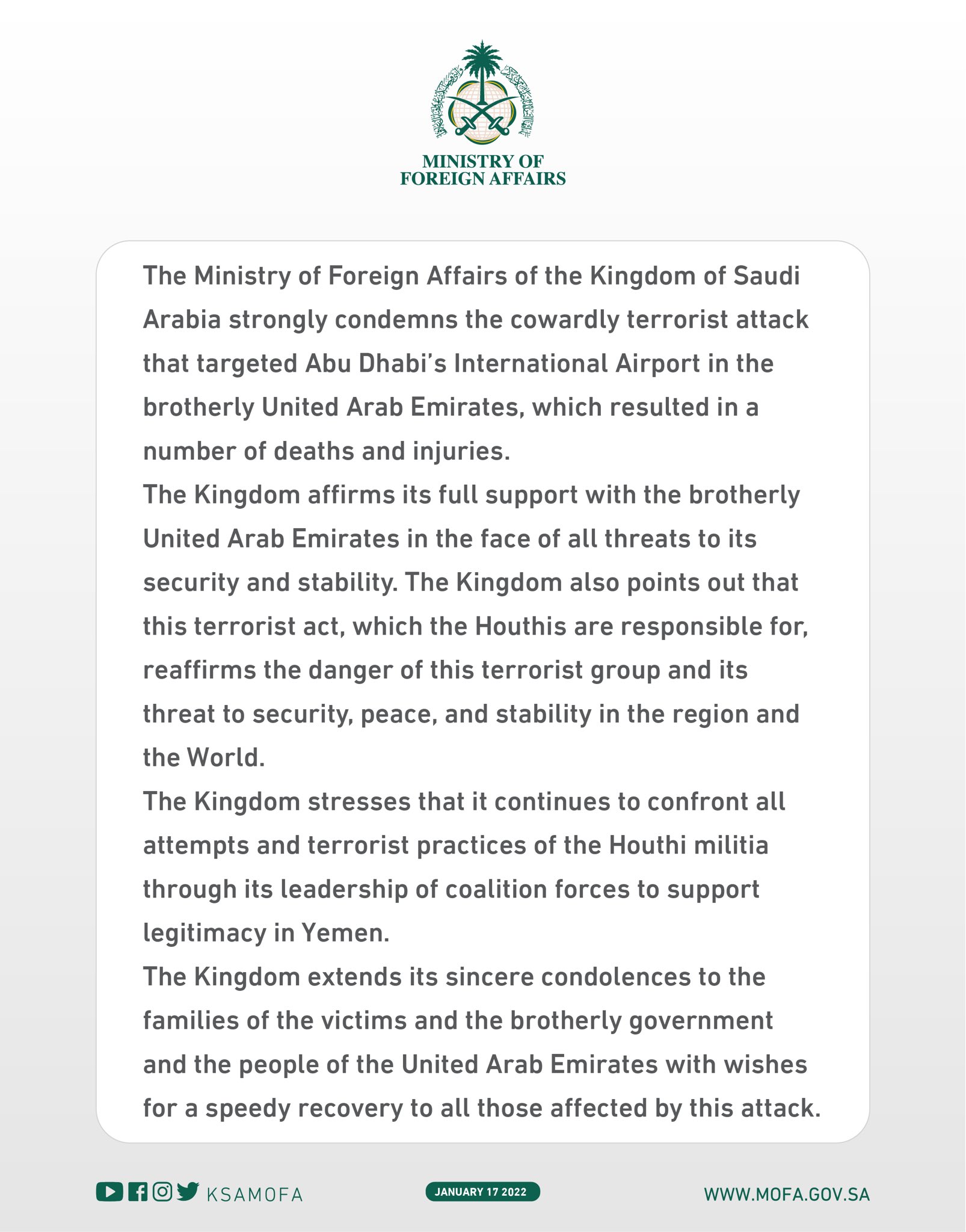
Gulf condemnation
The UAE said it reserves the right to respond after the Houthi attack on Abu Dhabi killed three Abu Dhabi National Oil Company employees.
“We condemn the terrorist Houthi militia's targeting of civilian areas and facilities on UAE soil today,” the country’s foreign minister said.
Sheikh Abdullah bin Zayed Al-Nahyan stressed that the attack would not go unpunished.
The foreign ministry described the attack “as a heinous crime committed by the Houthi militia” that goes against international and humanitarian law.
The ministry said that the militia continues its crimes unchecked in an effort to spread terrorism and chaos in the region in order to achieve its illegal aims and objectives.
It called on the international community to condemn and completely reject these terrorist acts that target civilians and civilian facilities.
The ministry expressed its sincere condolences to the families of those who died in the attack and wished the injured a speedy recovery.
Earlier on Monday, Anwar Gargash, diplomatic adviser to the UAE President, said the concerned authorities in the UAE are dealing with the “Houthi aggression” on civilian facilities in Abu Dhabi transparently and responsibly.
The militia’s violation of the region’s stability is too weak to affect the security and safety of the UAE, he added.
“The fate of this thoughtlessness and reckless foolishness is demise and defeat,” Gargash said.
Bahrain’s foreign ministry also condemned the attack and said that the “cowardly terrorist attack, which resulted in the death of three civilians and the injury of others, violates international humanitarian law and all other international laws.”
The attack “constitutes a blatant attack on the sovereignty of the UAE, reflecting the insistence of the terrorist Houthi militia to continue their cowardly criminal attacks,” the ministry said.
The ministry called upon the international community to take “necessary steps against the militia, whose hostile acts confirm that they are a terrorist organisation that poses a serious threat to the stability and security of the region.”
Kuwait also condemned the attack and the targeting of civilian areas in the UAE by the Houthi militia.
The country’s foreign ministry said the militia’s continued targeting of civilians and civilian areas and their insistence on violating international law confirms the danger of their behavior and the need for the international community to put an end to it.
The ministry said it supports any steps taken by the UAE to protect its security and stability.
Qatar expressed its strong condemnation and denunciation of the attack and said it considered the targeting of civilian establishments and vital facilities as a terrorist act that violates all international norms and laws.
The country’s foreign ministry reiterated Qatar's firm position on rejecting violence and terrorist acts that target civilians and civilian facilities.
Meanwhile, Oman’s foreign ministry expressed solidarity with the UAE and pledged to fully support the country’s measures in maintaining its security and stability.
In a statement issued on Monday, Oman strongly condemned the attack that targeted the UAE territories and killed civilians.
Global condemnation
The UN’s Secretary-General condemned the Houthi attack and urged all parties to exercise maximum restraint.
“Attacks on civilians and civilian infrastructure are prohibited by international law,” Antonio Guterres’ spokesman Stephane Dujarric said.
“The Secretary-General calls on all parties to exercise maximum restraint and prevent any escalation amidst heightened tensions in the region. There are no military solutions to the conflict in Yemen,” Dujarric added.
The US Secretary of Defense Lloyd Austin and the Department of Defense on Tuesday “strongly condemned” the attack.
“We remain committed to the UAE’s security and ability to defend itself, and stand united with our Emirati partners in defending against all threats to their territory,” Austin said.
In Rome, Italy condemned the missile and drone attacks and warned that this could badly impact regional stability.
“Italy … expresses solidarity with the victims’ families, and is close to the UAE government at this moment,” said the Foreign Ministry.
Rome “strongly condemns an act that, fueling the spiral of violence, may have repercussions on the entire region’s stability,” it added.
A ministry spokesman told Arab News: “Attacks against civilian targets jeopardize prospects for resumed peace talks aimed at ending the seven-year-old conflict in Yemen. We fully support such talks, and reaffirm our complete confidence in efforts toward a negotiated solution being pursued by UN Special Envoy Hans Grundberg.”
News of the attacks was discussed in a late-night debate in Italy’s Chamber of Deputies, the lower house of Parliament, where support for the UAE was strongly expressed by all parties.
“Italy and NATO must immediately take sides alongside the friends of the UAE to prevent the outbreak of a new and very dangerous war in the Arabian Gulf, with scary implications,” said Michaela Biancofiore, group leader of the Coraggio Italia party in the Chamber of Deputies’ Foreign Affairs Committee.
Massimo Mallegni, a senator for Forza Italia, told Arab News that the attacks are “a clear signal of the will to threaten not only the security of the UAE but also peace and stability in the Arab region. The civil war in Yemen is objectively a worrying danger for the UAE and for the Saudi government — Italy can only be on the side of those two friendly nations.”
The US strongly condemned “today’s terrorist attack in Abu Dhabi in the United Arab Emirates” and will work to hold the Houthi militia accountable after they claimed responsibility for the incident, National Security Advisor Jake Sullivan said on Monday.
“Our commitment to the security of the UAE is unwavering and we stand beside our Emirati partners against all threats to their territory,” Sullivan said.
Japan also strongly condemned the attacks claimed by the Yemen-based Houthis against the United Arab Emirates and called for an immediate halt to such attacks.
An official statement issued by the foreign ministry in Tokyo on Jan. 18 said the government of Japan expresses its condolences to those who lost lives in the incidents and their bereaved families.
“Peace and stability in the Middle East are important for the international community. The Government of Japan remains committed to continuously making serious efforts, in cooperation with countries concerned, to maintain and reinforce peace and stability in the Middle East,” the ministry said.
Following the attack, the UAE will ask the US to put the Houthis back on its list of terrorist organizations, Bloomberg reported.
The UAE will work on building pressure through the UN Security Council over the strike on Monday and the Houthi seizure of Emirati vessel Rwabee earlier this month, a source told Bloomberg.
US Secretary of State Antony Blinken also condemned the Houthi attack on the UAE in a phone call with his Emirati counterpart Sheikh Abdullah bin Zayed, Emirates News Agency reported.
Yemen’s foreign ministry said the attack shows the frustration felt by the militia after their recent losses in Shabwa, which was completely reclaimed from them last week, and the oil-rich province of Marib.
The ministry renewed its support for the Kingdom and the UAE and any measures taken by the countries to “confront these despicable terrorist acts, preserve the safety of their citizens and residents on their lands, and protect vital facilities.”
The Coalition to Restore Legitimacy in Yemen said that Houthi targeting of civilians in the Kingdom and the UAE are war crimes and that the militia must be held accountable.
It described Monday's hostile attack on the UAE as “cowardly” and “evil.”
Coalition spokesman Brigadier General Turki Al-Maliki said Houthi attacks on Saudi Arabia and the UAE are a threat to regional and international security and a flagrant violation of international humanitarian law.
“We will take the necessary operational measures to deter the hostile behavior of the Houthi militia,” Al-Maliki said.
“The escalation and hostile behavior of the Houthi militia confirms its threat to regional security and their attacks are an extension of their threat to the freedom of maritime navigation and global trade,” he added.
The Organization of Islamic Cooperation strongly condemned the terrorist attack and said it stands in solidarity with the UAE and supports any steps that the country takes to protect its safety.
Jordan’s foreign ministry said the country condemned “this cowardly terrorist attack” and stressed its absolute solidarity with the UAE.
“The security of the UAE is an integral part of Jordan’s security,” the ministry said.
It extended condolences to the families of the victims, and wished the injured a speedy recovery.
Egypt’s Sameh Shoukri, Minister of Foreign Affairs of the Arab Republic of Egypt, also told Sheikh Abdullah bin Zayed Al Nahyan during a phone call that the UAE's national security closely linked to Egypt's security.
Shoukri said Egypt strongly condemns the terrorist attack by the Houthi militia on civilian areas and facilities in UAE and fully supports the Gulf country’s measures taken to deal with any acts of terrorism.
Meanwhile, Nasser Bourita, Minister of Foreign Affairs, African Cooperation and Moroccan Expatriates, expressed similar sentiments in a phone call with his counterpart, Sheikh Abdullah bin Zayed Al Nahyan.
The Moroccan minister reiterated his country’s solidarity with the UAE in all its measures to defend its territories and the security of its residents.
He also expressed his condolences to the families of the victims and wished a speedy recovery for those who were injured in the incident.
The Arab Parliament issued a statement on Monday condeming the attack.
The Arab Parliament reiterated in its statement that the attack represents the Houthi militia’s cowardly terrorist aggression, is a violation of international humanitarian law and “a blatant attack on the sovereignty of the UAE.”
It has also called on the international community to “take firm steps against these militias whose criminal acts confirm that they are a terrorist organisation that poses a serious threat to the security and stability of the region.”
Mohamed Al Halbousi, Speaker of Iraq's Council of Representatives, also condemned the attack by the Houthis in the UAE during a phone call with Saqr Ghobash, Speaker of the Federal National Council (FNC), and offered his condolences to the victims’ families.
The European Union condemned the attack and said targeting civilians is “unacceptable.”
The Houthi attack increases the risk of escalating the conflict in Yemen and undermines efforts to end the war there, the EU said.
Britain’s Foreign Secretary Lizz Truss condemned “in the strongest terms the Houthi-claimed terrorist attacks on the United Arab Emirates.”
France condemned “in the strongest terms” the deadly drone attack on Abu Dhabi.
“These attacks threaten the security of the United Arab Emirates and regional stability,” Foreign Minister Jean-Yves Le Drian said.
“France expresses its support for the UAE in the face of these attacks,” he said.
Le Drian reiterated his call for the Houthis to “immediately cease their destabilising actions in Yemen and in the region and to engage constructively in a political process for exiting the crisis.”
“France reaffirms its mobilisation in favour of a cessation of hostilities in the whole country and a relaunch of talks with a view to a global political agreement under the aegis of the United Nations,” the minister said.
Algeria also condemned the attack.





